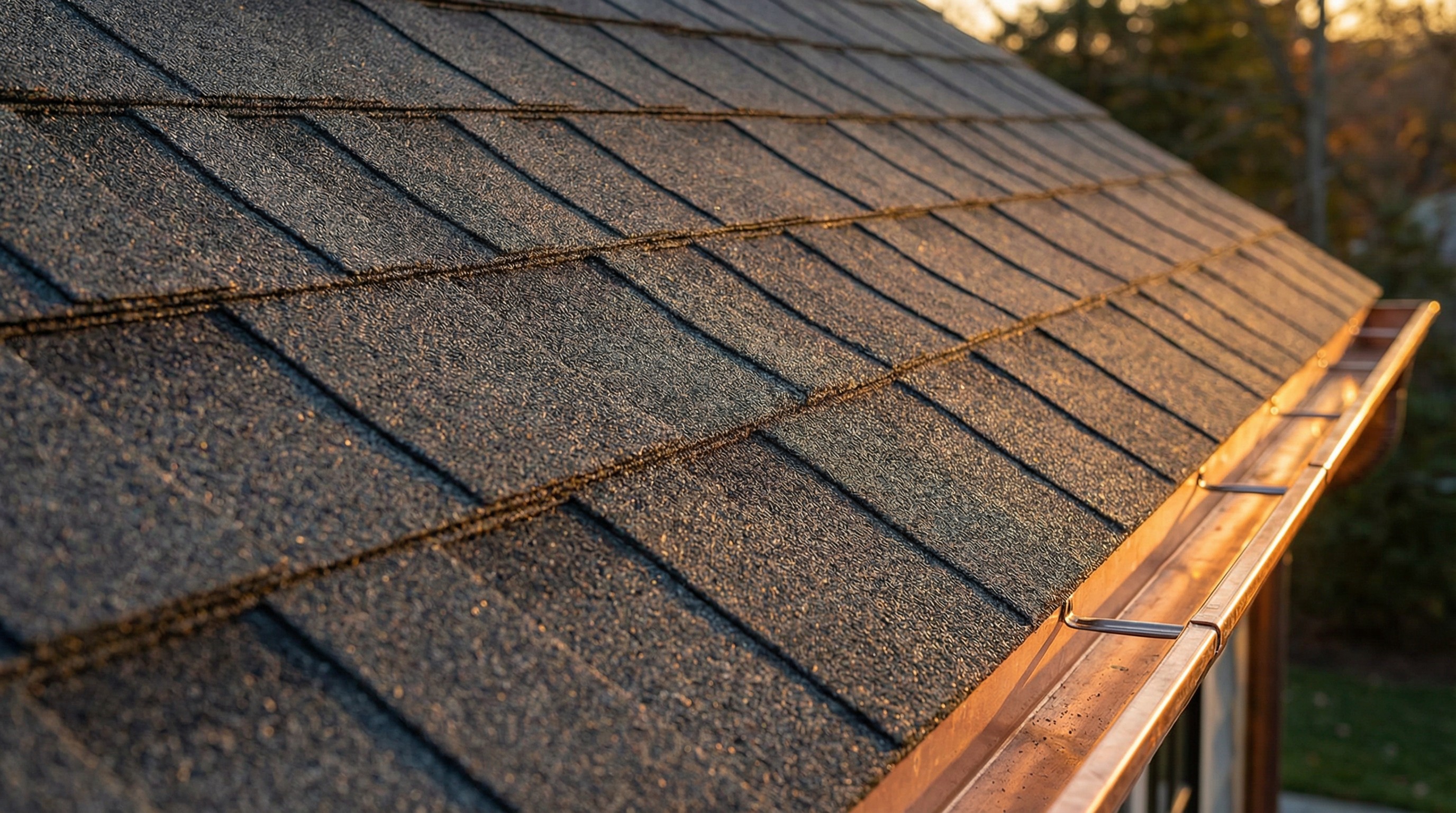Your roof is one of your home's most critical systems, protecting your family and everything inside. Choosing the right roofing contractor ensures quality workmanship and long-term peace of mind.
The tips below cover how to vet contractors, compare quotes, spot red flags, and protect your money from start to finish.
Why choosing the right roofing contractor matters
To pick a great roofing contractor, start with local referrals and online reviews from sources like Google and the BBB. Then verify the contractor is licensed and carries both liability insurance and workers' compensation. Get three to five detailed written estimates, make sure the contract covers materials, timeline, cleanup, and warranty terms, and avoid storm chasers or bids that seem too low. Clear communication and a strong local reputation matter more than the lowest price.
The contractor you choose often matters more than the shingles they install-a reality many homeowners overlook. A reliable, experienced pro will ensure a high-quality roof and a smoother project from start to finish.
The 12 tips below walk through exactly what to look for, what to ask, and what to avoid.
Tip 1. Get at least three to five roofing quotes
Comparing multiple quotes is the simplest way to avoid overpaying. When contractors know they're competing for your business, prices tend to come down.

You'll also spot outliers quickly, whether a bid seems suspiciously low or noticeably higher than the rest.
Why multiple quotes help you save money
Competition works in your favor. Beyond potential savings, multiple estimates reveal what's actually included in each price. One contractor might include upgraded underlayment in the base price while another lists it as an add-on. Without comparing, you'd never know.
How to request quotes without the sales pressure
You don’t have to sit through high-pressure presentations at your kitchen table. Many homeowners use roofquotes.com for straightforward, no-obligation quotes that save time and help avoid sales gimmicks.
Tip 2. Verify the contractor's license and insurance
Before any contractor climbs onto your roof, confirm they're properly licensed and insured. This protects you from liability if something goes wrong during the job.

How to check a roofing license in your state
Licensing requirements vary by state. Some states require a specific roofing license, while others include roofing under a general contractor license. Your state's contractor licensing board website allows you to search by company name or license number to verify current status.
What insurance coverage your roofer carries
Two types of insurance matter here:
General liability insurance: Covers damage to your property during the job, like a broken window or crushed landscaping
Workers' compensation: Covers injuries to workers on your property, so you're not held liable if someone gets hurt
Ask for certificates of insurance and consider calling the insurance company to verify coverage is current. Reputable contractors expect this request.
Why manufacturer certifications are worth asking about
Some contractors earn certifications from shingle manufacturers like GAF, Owens Corning, or CertainTeed. Certification means the contractor completed additional training and agreed to meet specific installation standards. It also often unlocks extended warranty options that aren't available otherwise.
Tip 3. Hire a local roofing contractor you can trust
Local contractors have something out-of-town companies don't: accountability. They live in your community, depend on local reputation, and will still be around if warranty issues come up five years from now.
Storm chasers operate differently-they follow severe weather from town to town, often leaving before any warranty issues surface. They often collect payment, do rushed work, and disappear before problems surface. A contractor with a permanent local office address is far more likely to stand behind their work long-term.
Tip 4. Check online reviews and call references
Reviews and references give you a window into what working with a contractor is actually like. Installation quality matters, but so does communication, cleanup, and how problems get handled when they arise.
Where to find honest reviews about roofers
Not all review platforms are equally reliable. Here's where to focus:
Google Business Profile: Most reliable for verified reviews from actual customers
BBB: Shows complaint history and how the company resolved issues
Nextdoor: Real recommendations from neighbors in your area
Facebook: Local community groups often have candid contractor discussions
Questions to ask when calling past customers
When a contractor provides references, actually call them. Ask whether the crew showed up on time and finished when expected. Ask about communication throughout the project, how thorough the cleanup was, and whether any surprises or hidden costs came up. The most telling question: would they hire the same contractor again?
Tip 5. Compare line-item estimates side by side
A line-item estimate breaks down exactly what you're paying for instead of giving you one lump sum. This format makes comparing quotes much easier and helps explain why prices differ between contractors.
What every roofing estimate includes
A complete estimate covers three main categories:
Materials: Shingle type and brand, underlayment, flashing, ridge vents
Labor: Tear-off of old roof, installation, cleanup and debris haul-away
Extras: Permits, dumpster rental, any necessary decking repairs
If an estimate is vague or missing details, ask for clarification before moving forward.
Why roofing prices vary so much between contractors
Price differences aren't always about one contractor trying to overcharge you. Legitimate reasons for variation include material quality (architectural shingles cost more than three-tab), labor quality (experienced crews command higher wages), overhead costs (companies with showrooms have higher operating expenses), and warranty coverage (extended warranties often come with higher upfront costs).
The cheapest quote isn't automatically the best value. Look at what's included, not just the bottom line number.
Tip 6. Make sure everything is in a written contract
Verbal agreements don't protect you. Everything discussed, from materials to timeline to payment terms, belongs in a written contract before work begins.

Scope of work and materials
The contract specifies exactly what work will be done and what materials will be used, including brand names and product lines. If you discussed upgraded underlayment or specific flashing during the estimate process, it appears here in writing.
Project timeline and payment schedule
Look for a clear start date, estimated completion date, and what happens if weather causes delays. The payment schedule outlines when deposits and progress payments are due.
Warranty terms and cleanup responsibilities
Your contract covers two types of warranties:
Warranty Type | What It Covers | Who Provides It |
|---|---|---|
Manufacturer warranty | Defective materials | Shingle manufacturer |
Workmanship warranty | Installation errors | Your roofing contractor |
The contract also confirms who handles debris removal and site cleanup after the job is complete.
Tip 7. Ask these questions before you sign anything
A few direct questions can reveal a lot about how a contractor operates. Good contractors expect questions and answer them without hesitation.
1. How Long Have You Been in Business?
Longevity suggests stability. A company that's been around for 10 years has weathered economic ups and downs and built a track record you can verify. Newer companies aren't automatically problematic, but asking for extra references makes sense.
2. Will You Handle the Permits?
Reputable contractors pull permits as a standard part of the job. If a contractor suggests skipping permits to save money, that's a red flag. Unpermitted work can cause problems when you sell your home or file an insurance claim.
3. Who Will Be on My Property During the Job?
Some contractors use their own crews while others subcontract the work. Neither approach is inherently wrong, but you deserve to know who will actually be on your roof and your property.
4. What Happens if Something Gets Damaged?
Accidents happen. A gutter gets dented, a shrub gets crushed, a window cracks from debris. Ask how the contractor handles damage claims before it becomes an issue.
5. What Warranties Come With the Roof?
Get specifics on both the manufacturer warranty and the contractor's workmanship warranty. Ask what's covered, what's excluded, and how to file a claim if something goes wrong.
Tip 8. Watch for red flags that signal a bad roofer
Knowing what to avoid is just as important as knowing what to look for.
High-pressure sales tactics
Contractors who create artificial urgency with immediate decision deadlines or expiring special prices are using classic high-pressure tactics that reputable contractors avoid.
Demands for full payment upfront
A small deposit to secure your spot on the schedule is normal. Demanding full payment before work begins is not. Standard practice involves a deposit, a progress payment when materials arrive, and final payment upon completion.
No physical address or local presence
Contractors without a verifiable local address-those using only P.O. boxes or out-of-state phone numbers-lack the local accountability that protects your investment.
Bids that are much lower than others
An extremely low bid often means cut corners, cheap materials, or hidden costs that appear later. If one quote is dramatically lower than the others, ask specifically why.
Tip 9. Understand the payment terms before work starts
Knowing what's normal helps you spot what isn't.
What a normal roofing payment schedule looks like
Most contractors follow a structure like this:
Deposit: 10-30% to secure the job and order materials
Progress payment: Due when materials arrive or work begins
Final payment: Due only after the job is complete and you've inspected it
How to protect your money until the job is done
Never pay in full before the work is finished and you've had a chance to inspect it. Roofquotes.com's escrow payment system holds your money until the job meets agreed-upon standards, giving you the leverage and protection that risk-conscious homeowners need when investing in their roof. This arrangement gives you leverage if issues arise and protects both parties.
Tip 10. Look for value instead of just the lowest price
The cheapest quote often costs more in the long run. A contractor who cuts corners on underlayment or flashing might save you $500 today but cost you thousands in leak repairs a few years later.
Value means quality materials, proper installation, solid warranties, and a contractor who communicates clearly throughout the process. Price is just one factor in that equation.

Tip 11. Take your time and avoid rushing the decision
Unless you have an active leak or major storm damage, there's no reason to rush. Good contractors typically have availability a few weeks out, and that's completely normal.
Storm chasers create artificial urgency. They knock on doors after hail storms claiming you need to sign today or miss out on insurance coverage. Insurance claim deadlines are typically much longer than storm chasers suggest, and you have time to properly evaluate your options. Take time to compare options and make an informed decision on your own timeline.
Tip 12. Know what to look for in a reputable roofing company
Pulling everything together, here's what a trustworthy contractor looks like: licensed and insured with current coverage, local with a physical address you can verify, positive reviews across multiple platforms, willing to provide references you can actually call, transparent line-item estimates that explain what you're paying for, written contracts covering scope, timeline, and warranties, and no high-pressure sales tactics or demands for full payment upfront.





